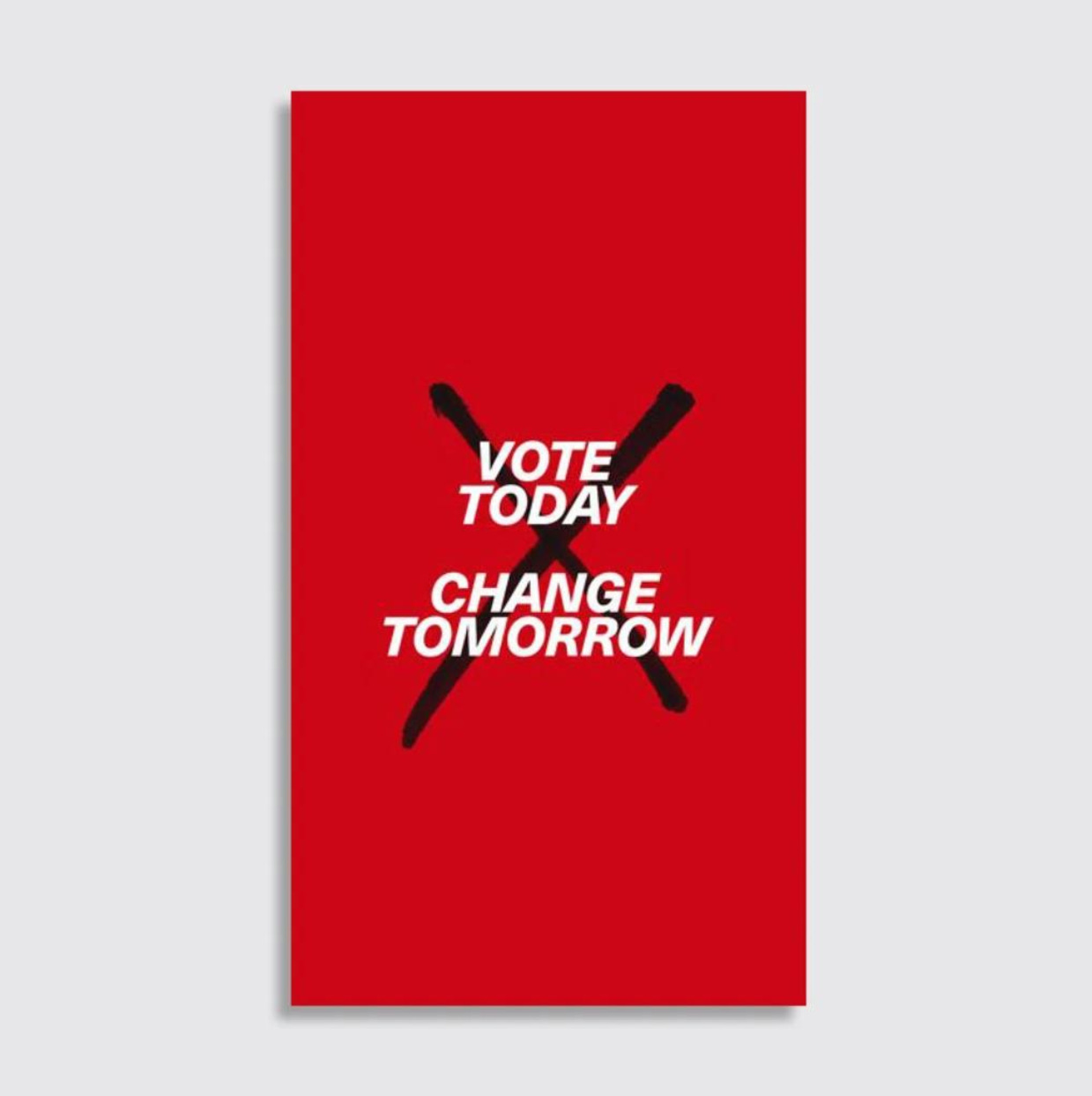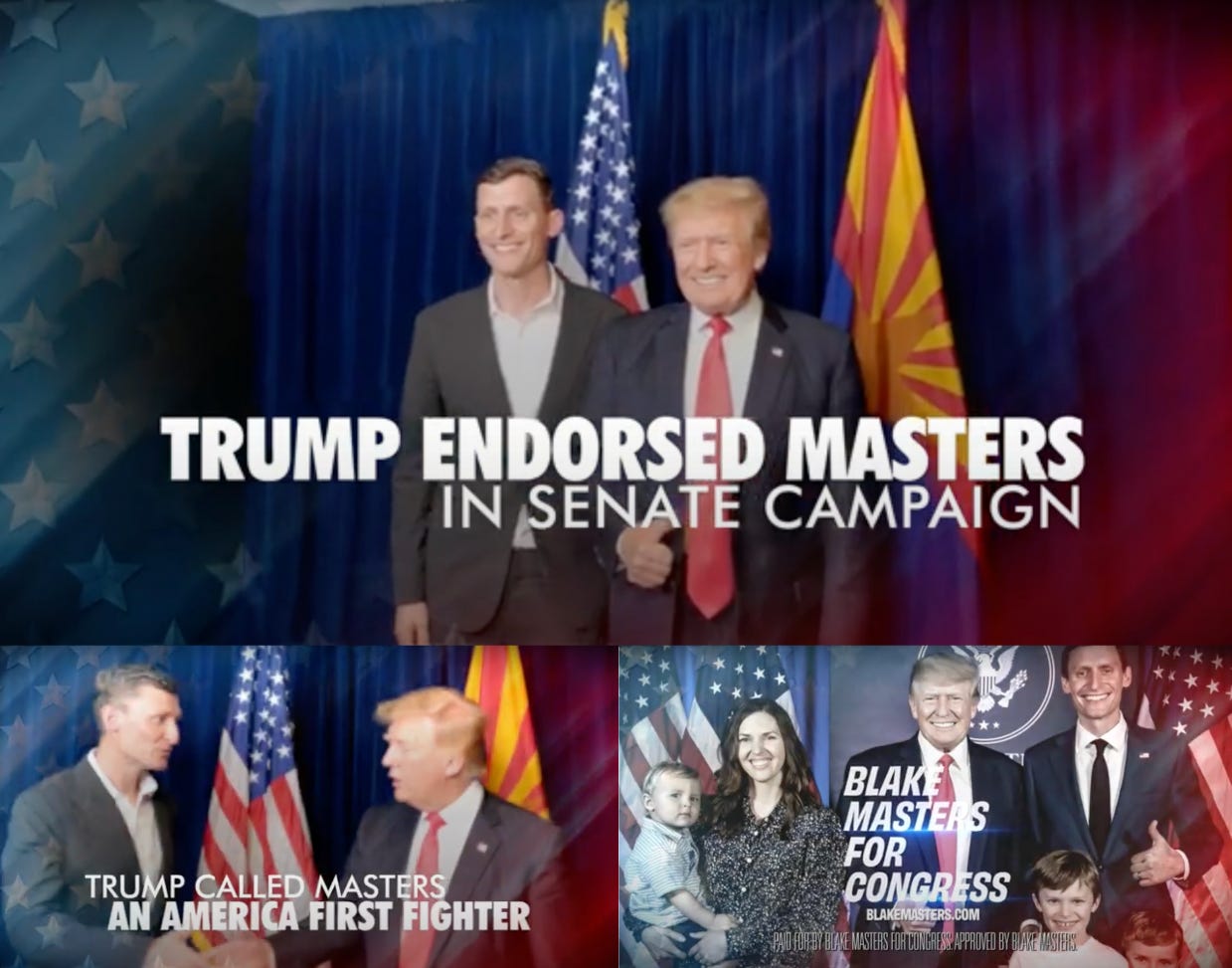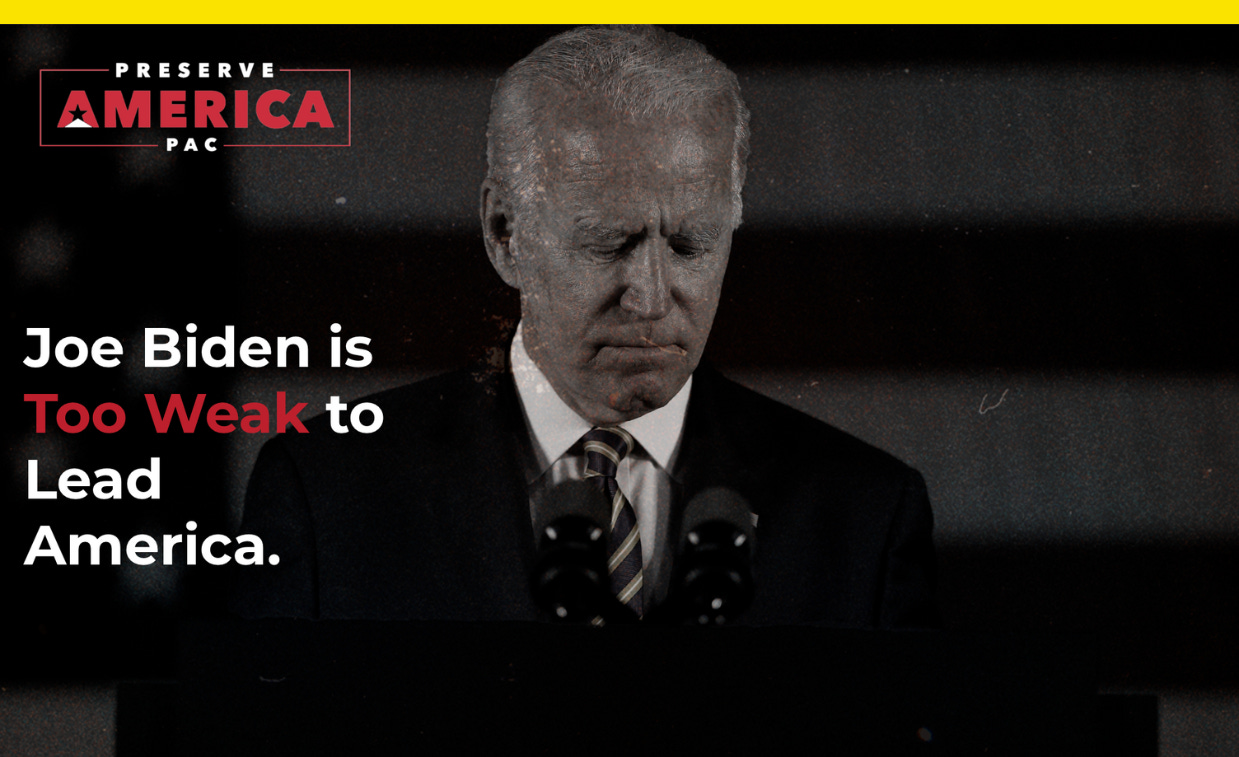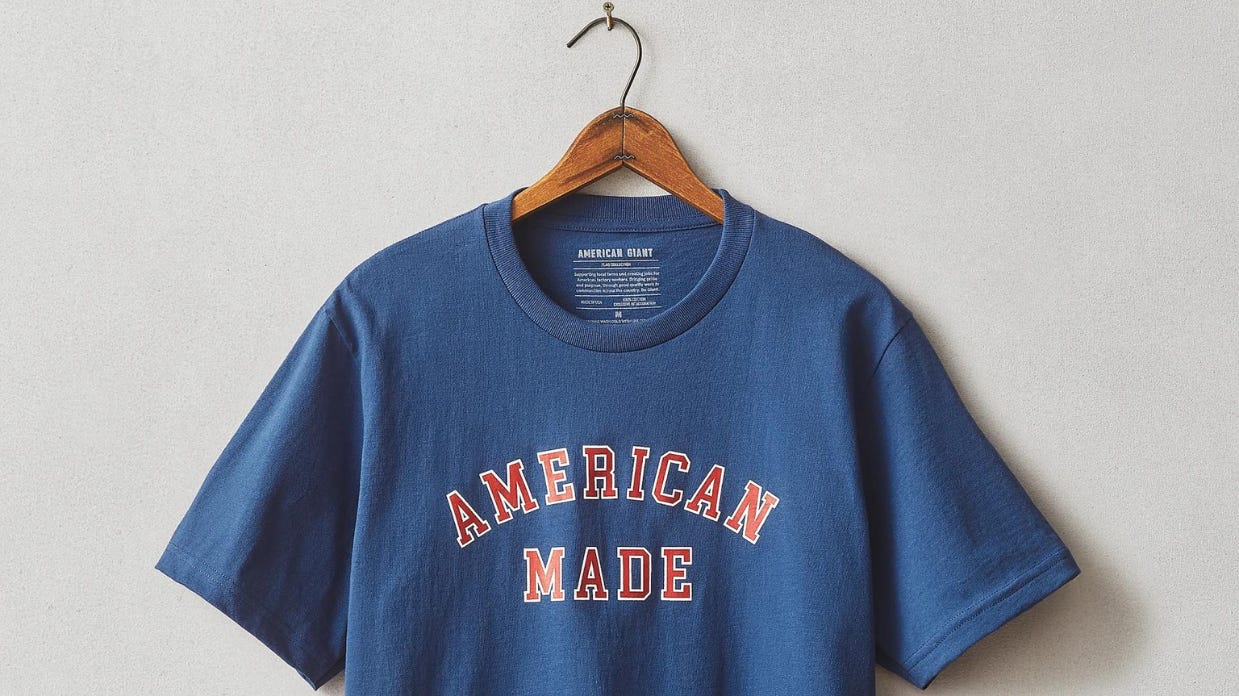Here’s the simple winning message the Labour Party used in the U.K. election
Plus: There’s a new wave of Biden attack ads on the horizon and they’re about to hit
Hello, in this issue we’ll look at…
Here’s the simple winning message the Labour Party used in the U.K. election
The Trump campaign is trying to enforce his endorsement
There’s a new wave of Biden attack ads on the horizon and they’re about to hit
Scroll to the end to see: which brand you’ll never believe is actually trying to do the opposite of fast fashion 👕
Here’s the simple winning message the Labour Party used in the U.K. election
After 14 years out of power, the United Kingdom’s Labour Party won a majority in the July 4 parliamentary elections to take back control of government. They did it with a simple message: “Change.”
Political messaging often boils down to one of two sentiments: now is the time for change, or now is the time to stay the course. See former President Barack Obama’s presidential campaign slogans during his first campaign versus his second: “Change we can believe in” in 2008 compared to “Forward” in 2012.
The cleverness in the Labour Party’s branding is that it was hardly clever at all. The party stuck largely to a one-word slogan that could be easily adapted. They used it across signage and advertising, rendered in a no nonsense typeface and set against the deep “Labour Red” (Pantone 199). Campaign signs held by supporters at events showed elements of the Union Jack flag and read “Change,” while digital ad templates used by local candidates had room for a candidate photo and the slogan “Vote for Change.”
Other social media assets read “It’s time for change. Vote for it,” and Labour leader Keir Starmer, who is now prime minister, unveiled a wallet-sized “pledge card” in May that listed six steps he would take “for change” if Labour won, like cutting wait times for the National Health Service and recruiting new teachers. The card featured a serious black-and-white photo of Starmer, who some compared to a photo of former Labour leader and Prime Minister Tony Blair in 1997.
Labour did have a secondary slogan that its brand guide calls its strapline: “Let’s Get Britain’s Future Back.” To American ears, it sounds vaguely MAGA, looking both forward—“Make America Great Again”—and backwards. Like MAGA, “Change” is a slogan that benefits from its lack of incumbency. Labour was able to frame the Conservatives as the party of Brexit, inflation, and pandemic response. The U.K. had lost its way, so vote for change.
Political observers in the U.S. sometimes look to election results from allied Western democracies for a tea leaf reading of the global political zeitgeist. With Labour’s U.K. win along with victories over the weekend in France by leftist and centrist parties over the far right, panicked Democrats may take heart.
But there’s a major difference between the political landscapes faced by the Labour and Democratic parties. As the incumbent, President Joe Biden isn’t running on change like Labour could; instead, he’s running on staying the course.
Biden’s camp chose “Finish the job” as his slogan. Meanwhile former President Donald Trump can now run as an outsider candidate who promises to bring change.
For Biden, there is no easy parallel between Labour’s strong showing and Democrats’ hopes for November. Instead, he’s running with a message that any change Trump makes will ultimately be bad for the country. It’s a tricky needle to thread, but considering the U.S. Supreme Court’s ruling on presidential immunity and “Project 2025,” the recently released blueprint for a second term written by Trump allies, the Biden campaign has new material to work with. They may well take at least one lesson from the Labour Party’s victory, though: Keep it simple.
A message from Yello Media:
Politics in the front, pop culture in the back.
My new newsletter about politics and pop culture takes its name from America’s long-lost political party. The Whigs carnivalized politics and turned campaigns into a party. They held big parades with log cabins on wheels and slogan balls, served hard cider to supporters, and sought to portray their leaders as heirs to George Washington. If politics today seems like a circus, well, we have the Whigs to thank.
Subscribe to Whig today to get my new free newsletter about politics and pop culture delivered each week:
The Trump campaign is trying to enforce his endorsement
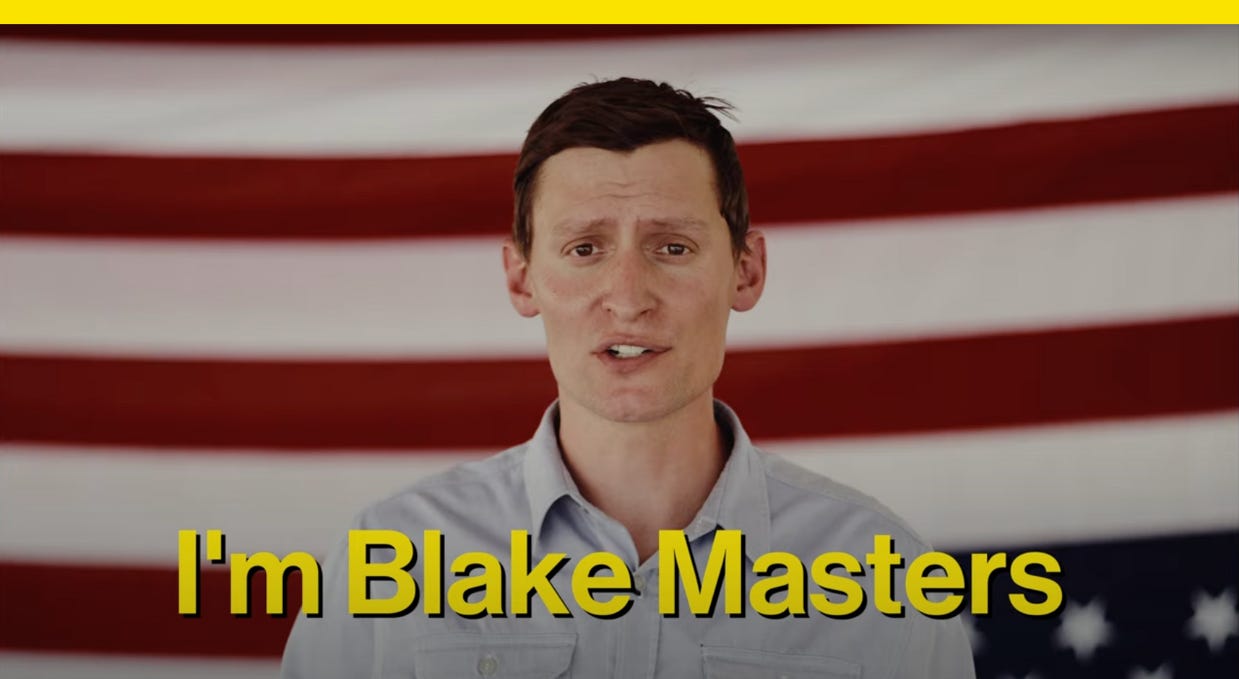
What’s a two-year-old Trump endorsement worth in 2024?
Republican Blake Masters won Trump’s endorsement in 2022 when he ran for U.S. Senate in Arizona and lost to Sen. Mark Kelly (D-Ariz.), but as he runs this year for a U.S. House seat representing an Arizona district he doesn’t even live in, things are different. For one, he doesn’t have Trump’s endorsement this time around.
Trump is instead backing Masters’ fellow Republican Abe Hamadeh ahead of the state’s July 30 primary. That hasn’t stopped Masters from touting his old endorsement, but the Trump campaign now wants Master to stop.
Ads like “Champion,” which features multiple shots of Trump with Masters, including the pair at a rally in Mesa, Ariz., in 2022 and a Masters family photo posing with Trump, isn’t technically being dishonest about the endorsement. Text on screen reads, “Trump Endorsed Masters In Senate Campaign.” Still, the Trump campaign reportedly wants that and other ads implying Trump backs Masters off the air.
Trump campaign adviser Susie Wiles called Masters to ask him to either take down or edit his ads so as to not imply Trump endorsed him for his current House race, according to the Arizona Republic.
Masters, who found progress pics he once posted to bodybuilding dot com included in an attack ad, has called his opponent Hamadeh “dishonest Abe” and included photos of Hamadeh wearing traditional Muslim garb while in Mecca when he was deployed with the U.S. Army in another one of his ads. Hamadeh has responded calling by his former ally “Blake the snake,” and Hamadeh’s campaign has called Masters’ ads “deceptive.”
Publicly, Masters seems unfazed. His pinned post on X is a video titled “Trump is the GOAT” that shows Masters standing in front of an upside-down flag, and in a recent tweet, he called on his followers to “Vote for Trump. Vote for me.”
Trump’s campaign is paying close attention to candidates who imply they have his blessing. His campaign rolled out an official “seal of approval” in April meant to distinguish between genuine and inauthentic Trump endorsements, and the campaign requires candidates who use it to share fundraising revenue.
There’s a new wave of Biden attack ads on the horizon and they’re about to hit
Following next week’s Republican National Convention, a pro-Trump super PAC is prepared to air $61 million worth of attack ads on TV and online hitting Biden.
Preserve America PAC, a group linked to Republican megadonor and Las Vegas Sands owner Miriam Adelson, is expected to begin airing ads in three swing states, Michigan, Pennsylvania, and Wisconsin. They’ll start the week after the Republican convention, which also happens to be the week the Paris Olympics start, and they’ll run through Labor Day, according to Politico.
“Joe Biden and his hard left allies have raised the cost of living, let terrorists cross our border, and crushed our veterans,” Preserve America senior adviser Dave Carney told Politico. “And we’re going to put a boot on their necks so he can’t continue ruining our country over the next four years.”
Another pro-Trump super PAC, MAGA Inc., plans to spend $100 million before Labor Day in four swing states, Arizona, Georgia, Nevada, and Pennsylvania. In a June memo first reported by the New York Times, MAGA Inc., CEO Taylor Budowich wrote that the group has identified persuadable voters in key swing states and plans to reach them with “specific and individualized means.”
“We know who we need to reach and how to reach them,” Budowich wrote. “We may not be able to outspend Democrats, but we can ensure the messages that are being distributed are done so using the targeting that each individual voter requires.”
Have you seen this?
Campaign rallies are getting dangerously hot. Literally. Both Republican and Democratic politicians have been holding rallies and other political events outside during a recent spate of heat waves—including a Trump rally that sent 11 people to the hospital in Phoenix, Arizona, in early June, when temperatures reached 111 degrees Fahrenheit. [Mother Jones]
This $12.98 Walmart T-shirt could change the fashion industry. Fast fashion forced brands to race to the bottom on price and quality. Walmart is now launching an American-made T-shirt that will cost a little more. [Fast Company]
The Spotify conspiracy theories about “Espresso,” explained. The theory seems to be an increasingly popular one: that the biggest music streaming platform in the world has arrangements with record labels to boost streams for particular songs and artists. [Vox]
You can be the voice of FLOTUS or Veep online. The Biden campaign is looking to hire social media platforms strategists for the First Lady and Vice President. [Whig]
Believe it or not, but Biden just had his biggest fundraising day. Nothing seems to move the fundraising needle this year as much as bad news. [Yello]
History of political design
Brought to you by Whig, my new newsletter about politics and pop culture. Subscribe here.
13-star “Harrison and Reform, The Hero of Tippecanoe” flag (1840). This campaign flag for William Henry Harrison, the first Whig president, referenced his nickname “Old Tippicanoe” for the name of a battle on the Tippecanoe River where he led U.S. troops against a confederation of Native American tribes near the present-day town of Battle Ground, Ind.
A portion of this newsletter was first published in Fast Company.
Like what you see? Subscribe for more:





